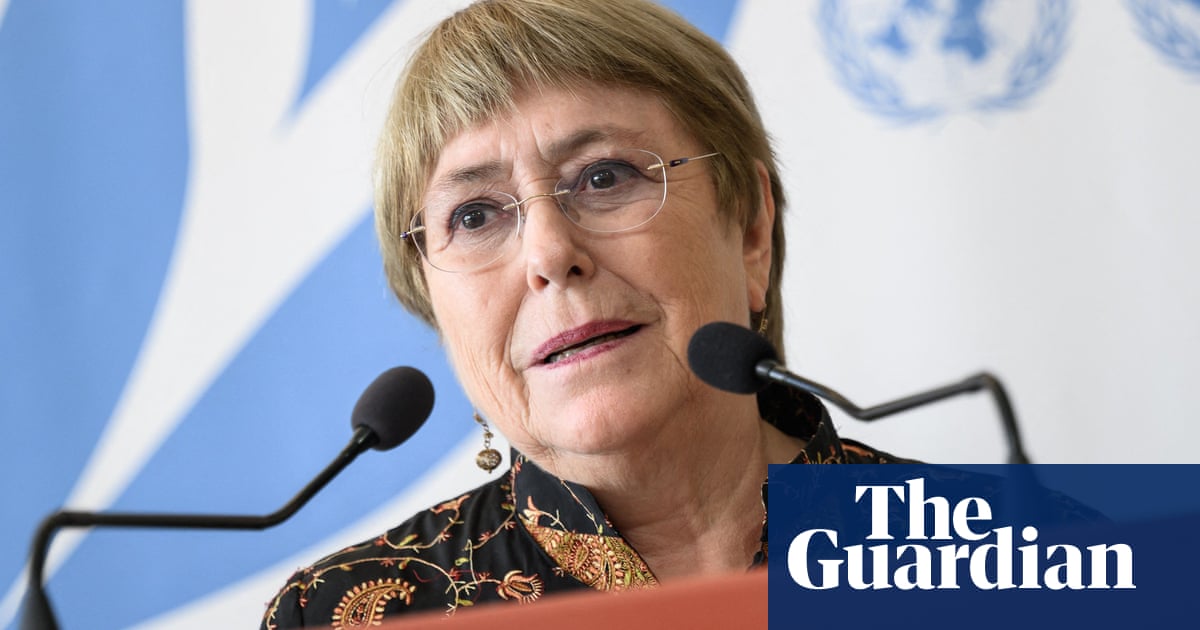
Show caption United Nations human rights commissioner Michelle Bachelet said there were limitations on her visit to Xinjiang, China. Photograph: Fabrice Coffrini/AFP/Getty Images Xinjiang UN human rights chief could not speak to detained Uyghurs or families during Xinjiang visit Michelle Bachelet says she was supervised by China officials throughout six-day visit that critics have called a propaganda coup for Beijing Helen Davidson in Taipei @heldavidson Thu 16 Jun 2022 06.23 BST Share on Facebook
Share on Twitter
Share via Email
Michelle Bachelet has said wasn’t able to speak to any detained Uyghurs or their families during her controversial visit to Xinjiang, and was accompanied by government officials while in the region.
The UN human rights chief, who this week announced she would not be seeking another term, told a session of the 50th Human Rights Council in Geneva that there were limitations on her visit to the region in China, where authorities have been accused of committing crimes against humanity and genocide against the Uyghurs and other Muslim minorities.
Bachelet and a team from the Office of the High Commissioner for Human Rights (OHCHR) spent six days in Guangdong and Xinjiang for a visit that activists and some western governments described as a propaganda coup for the Chinese government.
In a statement on Wednesday, Bachelet said she was able to meet members of civil society organisations without government supervision, but in Xinjiang was “accompanied by government officials throughout the visit”.
At a press conference in Guangdong held on the final day of her tour, Bachelet was asked directly by the Guardian about her ability to speak to Uyghur civilians and other people “without supervision” and to have free and open discussions about their experiences.
At the time Bachelet said that because of the Covid bubble they weren’t able to meet everyone “but with the people we were able to speak to, it was in an unsupervised manner”.
On Wednesday she reiterated “limitations” on the visit. “As it would be true of any high-level visit which by definition is not an investigation mission, there were limitations especially given the prevailing Covid restrictions,” she said.
“I visited Kashgar prison plus a former so-called VETC [vocational education and training centre], where I spoke to the authorities. I was not able to speak to any Uyghurs currently detained or their families during the visit. However, in anticipation of this, I did meet with some former detainees who are now outside the country and with families who have lost contact with loved ones ahead of my visit.”
After her visit Bachelet was criticised by rights groups, some western governments and Uyghur activists for failing to strongly condemn the Chinese government’s abuses in Xinjiang, and for using terminology favoured by the government in her press conference, including “vocational education and training centre”. VETCs are the government’s name for a network of facilities in which an estimated one million Uyghurs have been detained and allegedly subject to human rights abuses.
Activists including Uyghur human rights lawyer Rayhan Asat told media their families in Xinjiang had been prevented from leaving their homes by authorities during Bachelet’s visit. Asat’s brother has been detained in the Xinjiang system since he disappeared in 2016.
The OHCHR has been under pressure to release a long-awaited report on the human rights situation in China, which was completed in late 2021.
On Wednesday during a separate address, Bachelet said her office was working on updates to their assessment of the situation in Xinjiang which would be shared with the Chinese government for comment before publication.







